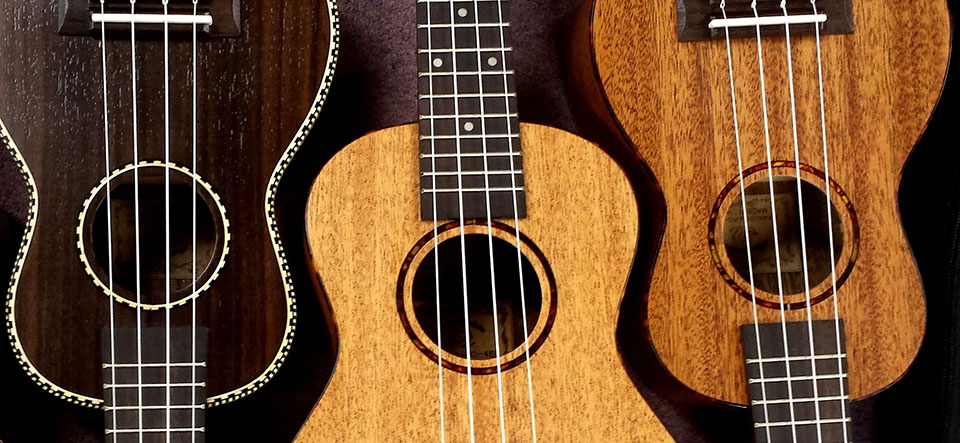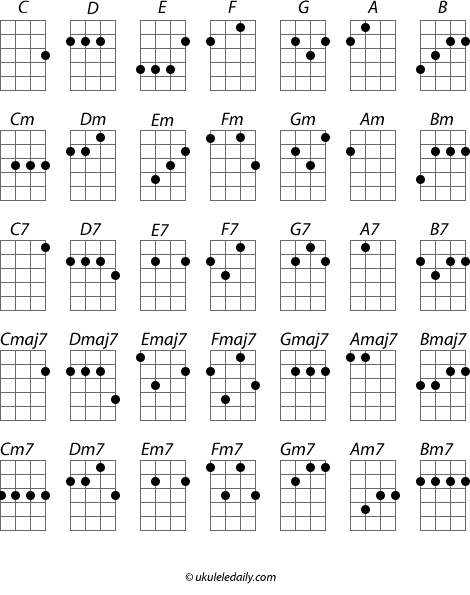Ukulele
Learn To Play The Ukulele
If you know how to play the guitar, does that mean that you also know how to play the ukulele? Or is a ukulele the same thing is a mandolin?
In this article we will give you a basic understanding of the ukulele, and teach you everything you need to know if you have never played a ukulele before. We will also give you some good tips on practicing and finding the right tutor for you.

Table of contents
The History Of The Ukulele
The ukulele hails from Hawaii, where it got it's current shape in the late 1800's. Shortly thereafter, the ukulele made its way to the US mainland, along with the lapsteep guitar, which also hails from Hawaii. The lapsteel would eventually become popular in country music. Since then, the ukulele has been appeared in several genres, including pop and quite a few roots genres, and it quickly became popular among surfer communities.
The ukulele uses soft nylon strings, and the narrow, flat fretboard and limited number of frets makes learning to play it easy. Due to its small body, the ukulele is not capable of producing much volume, but it has a quite high pitch which allows it to cut through the mix.
How To Tune The Ukulele
In order to use the common chords - not to mention play with others - the ukulele must be tuned correctly. Standard tuning for the ukulele is based on the note A, which is at 440 hertz. You can find this note either by using a tuning fork or an electric tuner, or by using a tuning app on your phone. You can also use a piano, if you know how the notes are laid out.
By turning the tuning keys on the headstock, you can tune the four strings. The notes on each string are as they would be for any stringed instrument (C - C# - D - D# - E - F - F# - G - G# - A - A# - B - C). Standard tuning for a ukulele is G - C - E - A, going from thinnest to thickest string. This standard tuning will produce a C6-chord if you play without fretting any of the strings.
Practice, Positions And Warm-Up
Before playing or practicing, it is important to always warm up. This prevents straining the muscles, and greatly reduces the risk of getting Tenosynovitis. For this reason it is also important to take frequent breaks when practicing, allowing the muscles to relax. Playing becomes much more comfortable if the instrument is positioned correctly on the thigh while seated, and if the neck is held at an angle which allows the wrist to bend. When playing while standing, it is important to adjust the strap so that the ukulele is positioned at the same point on your body as it would be if you were seated.
Chords
Chords are a grouping of notes which, when played together, sound harmonious. There are several ways to play chords on the ukulele, providing a great deal of variety.
Open chords require very few fingers to be used, as the strings that are not fretted (pressed down) are still played. Below you can see diagrams of some common ukulele chords.

Barre chords are based on fixed fingerings, and can be moved up and down the neck. This makes it possible to play semitone intervals, which is not possible with the open chords. Barre chords require more finger strength, making them a hurdle for many new players, but once they have been learned they are immensely practical and logical.
Scales
A scale is a fixed sequence of intervals between notes, and it can be described as an alphabet for writing melodies. The scale also determines whether the key is major or minor, though it should be noted that although these are the most popular modes, there are many others which have their own sound. Examples of this include the blues scale and the scales commonly used in Indian music. Learning a scale will allow you to know which chords to use with it, and how to improvise over those chords. The more scales you know, the greater your musical vocabulary, so to speak.
My First Ukulele
When you start playing the ukulele, it is important to find a model which suits you. Ukuleles are available in a variety of price ranges, and are generally quite cheap compared to other instruments. For this reason, you can easily invest in a quite inexpensive ukulele to begin with, and then upgrade later on when you want to.
Tips For Beginners
Here are some good tips for new ukulele players.
1. Practice daily
Practicing for ten minutes every day will yield better results than practicing for one hour once a week. It also helps to strengthen your fingers and build muscle memory. If possible, keep your ukulele within reach so you don't have to waste time unpacking it for each session.
2. Build callouses and more finger muscles
The skin on your fingers needs to get used to the pressure of the strings, and it is not uncommon to get sore fingers and perhaps even blisters if your play for too long at a time. On the other hand, if you don't practice frequently enough, you won't build up the necessary callouses.
It is also important that you get used to using your finger muscles without tensing your wrist, forearm, elbow and shoulder. If you start to feel discomfort in your hand or your arm, it is important to either change your position or take a break. In the beginning it may feel like a challenge to build up the necessary hardiness, but it will come quicker than you think if you simply persevere. Anyone can achieve it, regardless of age, build or physical strength.
3. Take care of your ukulele
A ukulele is a delicate instrument, and deserves its own box or gig bag (A specially made rucksack, made of a thick, protective material). Do not lean it against the wall or place it on the floor. Instead, purchase a ukulele stand so that it is secure and within reach.
4. Have extra strings
Always keep at least one extra set of strings in your ukulele box or gig bag. When a string breaks it should be replaced immediately, so that the ukulele stays in tune and the wood is not warped due to the change in pressure from the strings.
5. Stay motivated
Make sure to play songs that you like, so that practicing does not start to feel like a chore. Make sure to tell your teacher what YOU want to learn, so that you can work together on planning the teaching so that it suits you. There is nothing quite like the feeling of success when you have learned to play one of your favourite songs.
Easy Songs To Play On The Ukulele
Perhaps you already own a ukulele, and you want to get started on learning some songs. We've made some great tutorials of popular songs, so take a look and get started today:
- Learn To Play "Me!" On Ukulele
- Learn to play "I'm Yours" on ukulele
- Learn to play "Creep" on ukulele
- Learn to play "Yellow" on ukulele
- Learn to play "Old Town Road" on ukulele
- Learn to play "Love Story" on ukulele
- Learn to play "Let Her Go" on ukulele
- Learn to play "Perfect" on ukulele
- Learn to play "Wish You Were Gay" on ukulele
- Learn to play "Hallelujah" on ukulele
- Learn to play "I Guess I Just Feel Like" on ukulele
- Learn to play "Shallow" on ukulele
- Learn to play "Free Fallin'" on ukulele
- Learn to play "Save Tonight" on ukulele
- Learn to play "Sweet Home Alabama" on ukulele
- Learn to play "Knockin' On Heaven's Door" on ukulele
Find Ukulele Lessons Near You
Do you want to learn how to play the ukulele? Maybe you already know, but you want to improve your abilities? We have lots of talented and experienced teachers all over the country. Find a teacher in your city today!
Who Are We?
The office team of MusicTutors are all professional musicians and educators. We also believe that we have the best job in the world. We get to spend our day talking to students across the country about how much they love music and we have helped hundreds of people connect with the perfect, professional tutor for them. We'd love to help you too! Please get in touch with us and tell us your story. 07946125613 Or send us a mail to [email protected]. We can't wait to hear from you!
